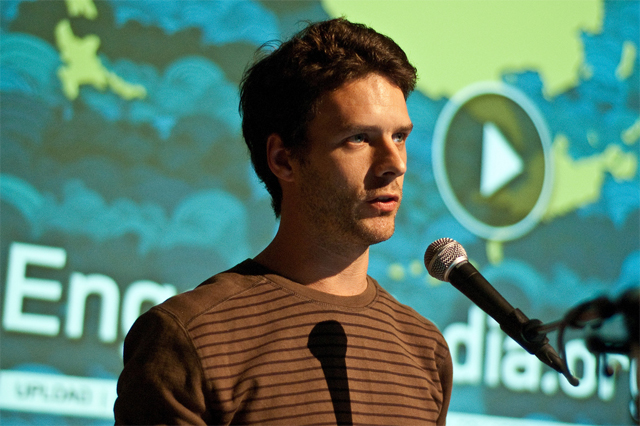
Andrew Lowenthal - 'The Public, the Private and Media Autonomy'. Photo by Anne Helmond.
On the second day of Video Vortex at the Trouw in Amsterdam Andrew Lowenthal addresses the issues of how to use and distribute video politically and how do you do that independently and autonomously.
Andrew Lowenthal began by giving an overview of what EngageMedia has been doing over the past six years. They came out of the indymedia movement and are concerned with social and environmental issues in Asia pacific. At that time that they got started the tools needed for video distribution were not widely available. Media activist intervention was needed if the tools were going to be there. They’ve developed an online video sharing platform and their work revolves around how to use the tools that are out there for political and social impact. The literacy, skills building and generating ideas on how to effectively use the tools that are available.
This presentation raises some important issues and reflects on the need for Indymedia movements for online video activism. One of the issues raised is that not only the number of hits matters but also who is watching matters. If your video gets 200 hits on Youtube and also 200 hits on for instance Engagemedia, who is watching is going to be very different. It is great if people watch the video on Youtube but getting the engagement that you need is a different question. Another issue that Lowenthal addressed is, how do you as social movement compete with other movements? This, for Lowenthal, remains an open question. He went on to discussing several projects that Engagemedia have been doing.
Lowenthal briefly touches upon web 2.0 and the decline of media activism. The contradictions that can be seen are now too difficult to ignore. Now with the advent of wikileaks and companies like Amazon and Paypal distancing themselves and pulling the plug, it is increasingly becoming apparent how much we depend on these kind of companies and how much we have under-emphasize the independent infrastructure that we need. Especially, according to Andrew Lowenthal, as social movements keep growing and conflict with the interest of these companies.
He further discusses the question of how do you distribute video politically. Open technologies and licenses are part of it but also important is how do you build new geographies across borders. Lowenthal sees video and the Internet as drawing new political spaces, that don’t actually have to conform to the traditional political terrain that we are often governed by. Shifting the political terrain is what they are trying to do. He goes on to discuss what is so special about video which is in his mind, the overcoming of otherness. Otherness, according to Lowenthal, often proceeds violence. In order to exclude someone, you have to ‘other’ them. With video you can overcome the otherness and build relationships between people and issues that are quite similar. EngageMedia is interested in drawing together the commonalities between the various issues. People often contextualize the issues just within the nation-state that they exist in even though these processes are beyond (or at least partially) the control of any one institution. The question than remains how do you build these cross-border and cross-cultural collaborations? Lowenthal believes that there is a huge amount of potential in the tools that are available, for instance universal subtitles project.
Lowenthal concludes with some interesting remarks. EngageMedia is interested in creating independent autonomous structures but also in creating spaces within the corporate spaces that have emerged, or the culture within them. He went on to say that people go to all sorts of lengths to get the content they want, upload it and find it. If they want the content, they will find it. Lowenthal concluded with the remark that the infrastructure is very important, but if you don’t have content that speaks to the aspiration and the needs of the people you can’t hit the mark.
About the author: Ryanne Turenhout is a master student of New Media and Digital Culture at Utrecht University.


